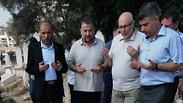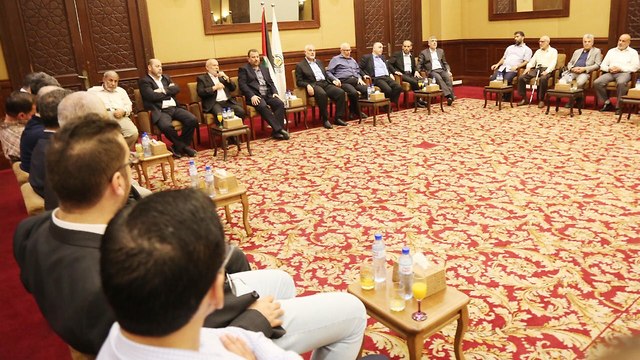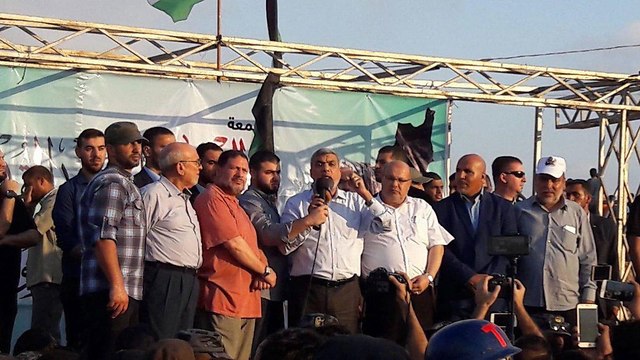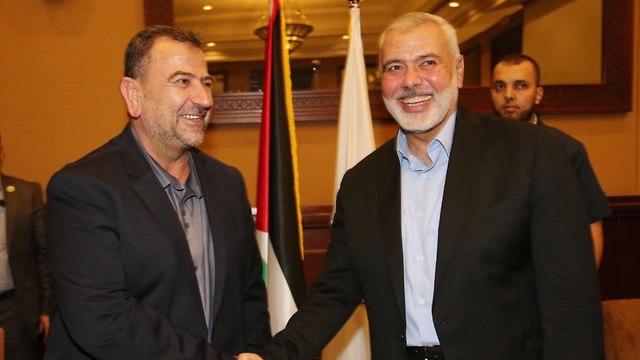
Hamas leaders pray at Sheikh Ahmed Yassin's grave
Behind the scenes of the Gaza ceasefire talks
The unpleasant reception by the Egyptians at the Rafah border crossing, the prominent Hamas figures visiting Gaza for the first time, the strict compartmentalization of discussions, and what did Abbas do when he found himself pushed aside? All of the details on the discussions in Hamas over the proposed ceasefire agreement with Israel.
The arrival of the Hamas delegation to the Gaza Strip was accompanied by quite a few difficulties, as it includes quite a few individuals that Israel would completely veto their presence in the area on any other day.
In addition to Saleh al-Arouri, the founder of the Hamas military wing in the West Bank and a mastermind of violent attacks against Israelis in the past, the delegation also included Mahed Obeid, who replaced al-Arouri as the head of Hamas in the West Bank and was put in charge of directing terror attacks against Israelis from the territories; Mousa Doudin, who handles the matter of Palestinian prisoners jailed in Israel; and Hamas leader abroad Maher Salah, who is also in charge of the organization's finances.
When the delegation arrived at the Rafah border crossing in a long convoy, Egyptian authorities prepared an unpleasant reception for them. Egyptian security personnel conducted thorough searches of the delegation's many vehicles, including going through the senior Hamas officials' personal belongings. The Egyptians also made sure each official coming into the strip was on a list of authorized personnel, to ensure Hamas does not try to bring any unwanted elements into Gaza.
The Egyptian authorities were likely looking for cash money they suspected Hamas might try to smuggle in by taking advantage of this opportunity. Some in the Gaza Strip believe this was also an Egyptian message to the Hamas leadership not to turn down the ceasefire proposal. But it appears the main reason for the search is the Israeli demand to prevent unwanted elements from entering the strip as well as to stop the transfer of money meant for Hamas's military wing.
The Hamas discussions over the weekend were conducted under the cover of secrecy, with Hamas imposing strict compartmentalization on the talks. All mobile phones were left out of the room and, unusually, so were the Hamas leaders' personal bodyguards—all in an effort to prevent any leaks of what was said.
In additional to the terror group's political leadership, the discussions also included representatives of Hamas's military wing.
The Hamas officials discussed three main issues: the Egyptian proposal to re-implement the reconciliation agreement with Fatah, the arrangement proposed by UN Envoy Nickolay Mladenov for a ceasefire with Israel in return for a significant easing of the Gaza blockade, and the option of including a prisoner exchange between Israel and Hamas as part of the deal.
Hamas avoided bringing the other Palestinian factions in the strip in on the talks. To stave off possible dissent, a briefing by Hamas official Husam Badran was scheduled for the other factions, to keep them apprised of the talks. But they will not be asked for their opinion on the matter, nor will their positions be taken into account.
The umbrella agreement is supposed to include several basic principles. In the first stage, the reconciliation agreement between Hamas and Fatah will be restarted. Following this or in tandem, a truce will come into effect with Israel.
This in turn would lead to the permanent opening of the Rafah crossing with Egypt and the Kerem Shalom crossing with Israel, with the Rafah crossing also including the entry of goods in addition to people.
The final stage would entail a long-term ceasefire with Israel and a prisoner exchange deal.
At present, it appears the main obstacle is internal, with Palestinian Authority President Mahmoud Abbas feeling entirely left out of the dialogue, which mostly takes place between Hamas and Israel under the auspices of Egypt and UN Envoy Mladenov.
Therefore, Fatah has begun submitting different reservations to the Egyptians about the reconciliation plan. To add fuel to the fire, Fatah warned Hamas not to sign an agreement with Israel, as it would come at the expense of Palestinian unity. Hamas officials responded that those who have security coordination with Israel have no right to talk about the Gaza Strip's sacrifice.
It is still unclear how Egypt would deal with the obstacle set by Fatah. At the moment, the escalation between the two warring Palestinian factions is only increasing. Fatah and Hamas delegations were due to meet in Cairo on Saturday under the auspices of Egyptian intelligence to discuss the final version of the reconciliation plan, but the meeting was canceled.














